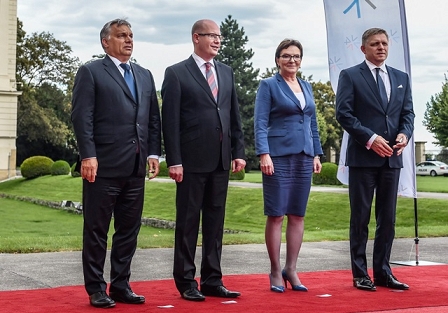Erstellt am: 8. 9. 2015 - 15:02 Uhr
Visegrad: "It's about control"
If the European Commission is going to come up with a fair and workable policy to deal with the influx of refugees, first they will have to get past the Visegrad group .
Visegrad, or the V4, comprises Poland, Slovakia, the Czech Republic and Hungary, and they are the main stumbling block to what the Commission considers a fair policy of refugee quotas.

EPA/FILIP SINGER
Back in the Spring, when the last quota plan was under discussion, Visegrad rejected the idea out of hand. At the time, the proposal for Slovakia, for example, was that it should take just 3% of the refugees flooding into the EU. Not a massive percentage, you might think, particularly considering that refugees already in the country are counted as part of the quota. Why won't these countries take their share?
The aspect that makes the Visegrad officials balk is the whole concept of a binding percentage, which, they say, would mean they lose control of their refugee policy. 3% of what number? With the number of refugees increasing all the time, one can see they have a point. 3% could mean any number of individuals, so it's perhaps understandable that these countries should be concerned about agreeing to take an unspecified number of refugees.
That argument could, of course, be applied to any country in the EU, or anywhere else - but the rest of Europe seems to have less of a problem with it.
Scratch a little deeper below the surface, and a far more insidious reason why these countries don't want refugees emerges. It's not refugees per se, it's these particular refugees, most of which are Muslims. Visegrad has a long and dark history of Islamophobia at the very highest levels.
Our Eastern Europe correspondent, Rob Cameron, explains the complex attitudes in the Visegrad countries, and why, if they are going to be part of the solution, the problem will have to be re-framed.
Dieses Element ist nicht mehr verfügbar
Refugees and the Gulf States
Ariane Rumery of the UNHCR explains how the Gulf States are responding to the refugee crisis, and why the reporting is sometimes misleading.
Dieses Element ist nicht mehr verfügbar
Turkey pledges to destroy PKK
Dorian Jones reports from Istanbul on Prime Minister, Ahmet Davutoglu's promise to "wipe out" the PKK following a deadly attack on the Turkish army.
Dieses Element ist nicht mehr verfügbar
UK Referendum moves closer
As the British parliament's House of Commons passes EU referendum legislation up to the House of Lords, analyst Melanie Sully examines the question which will be put to the British people.
Dieses Element ist nicht mehr verfügbar
Hope for climate talks
Economist and Director of the Earth Institute, Jeffrey Sachs, explains why he is optimistic about the Paris Climate Summit.
Dieses Element ist nicht mehr verfügbar
FM4 Reality Check
Monday to Friday from 12.00 to 14.00, Saturday from 12.00 to 13.00, and after the show via Podcast or fm4.orf.at/realitycheck.


